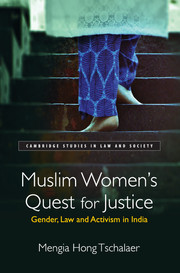Book contents
- Frontmatter
- Dedication
- Contents
- Preface
- Acknowledgements
- Abbreviations
- 1 From Legal Binaries to Configurations: Muslim Women's Rights Activism in South Asia
- 2 A Multidimensional Approach to Muslim Women's Activism: Mapping the Legal Landscape in the City of Lucknow
- 3 Destabilising Gendered Proprieties: Muslim Women's Visibility within the Public Space
- 4 Vying for a Gender Just Islamic Marriage Contract: Women's Legal Spaces
- 5 Legal Realities: Doing Gender Justice from Below
- 6 Muslim Women's Quest for Justice: Theoretical Implications and Policy Suggestions
- 7 Appendices: Model-Nikahnamas
- 8 Glossary
- 9 Bibliography
- 10 Index
6 - Muslim Women's Quest for Justice: Theoretical Implications and Policy Suggestions
Published online by Cambridge University Press: 08 February 2018
- Frontmatter
- Dedication
- Contents
- Preface
- Acknowledgements
- Abbreviations
- 1 From Legal Binaries to Configurations: Muslim Women's Rights Activism in South Asia
- 2 A Multidimensional Approach to Muslim Women's Activism: Mapping the Legal Landscape in the City of Lucknow
- 3 Destabilising Gendered Proprieties: Muslim Women's Visibility within the Public Space
- 4 Vying for a Gender Just Islamic Marriage Contract: Women's Legal Spaces
- 5 Legal Realities: Doing Gender Justice from Below
- 6 Muslim Women's Quest for Justice: Theoretical Implications and Policy Suggestions
- 7 Appendices: Model-Nikahnamas
- 8 Glossary
- 9 Bibliography
- 10 Index
Summary
This book puts forward the claim that understanding the legal world as plural is an important starting point to think about women's access to justice. In fact, the adjudication of Muslim family law in contemporary India is not confined to the formal legal system. Rather, it often takes place in the shadow of the state: in the offices of Non Governmental Organisations (NGOs), community justice centres such as the Darul Qaza, the mosque, and people's homes. The potential that non-state law and practice hold for the protection of gender justice in the area of the Muslim family law in South Asia, however, is a contentious issue. There has been a highly polarised and politicised debate on the reform of Muslim family law on the Indian subcontinent. All too often the relation between gender justice and religion is reduced to one of conflict between Muslim women's rights activists and the state and/or the Muslim leadership. In the context of South Asia, the continuing controversy has thus been long on polemic and ideological positions but often short on facts. As a result, we know very little about the importance of community leaders, religious officials, and women's rights activists in Muslim women's everyday struggles for gender justice in the area of family law. Thus, the complexity of the political and sociolegal field is overlooked in scholarship that discusses Muslim women's rights in isolation - rather than inter-relation - with state and non-state legal institutions.
Muslim Women's Quest for Justice addressed this contentious issue through an empirical scrutiny of ongoing initiatives of sociolegal reform from below. It sought to fill this gap by analysing the manners in which several Muslim women's rights organisations rooted in the city of Lucknow - namely the All India Muslim Women's Personal Law Boar (AIMWPLB), the Bharartiya Muslim Mahila Andolan (BMMA), and Bazme Khawateen (Women's Club) - articulate ideas of Islamic gender justice within a complex patriarchal and polycentric legal landscape.
- Type
- Chapter
- Information
- Muslim Women's Quest for JusticeGender, Law and Activism in India, pp. 180 - 198Publisher: Cambridge University PressPrint publication year: 2017



